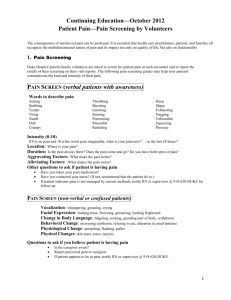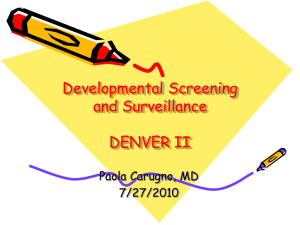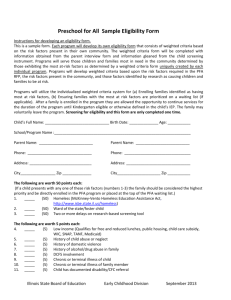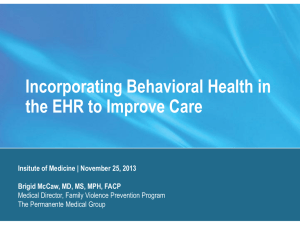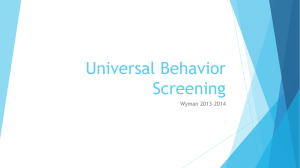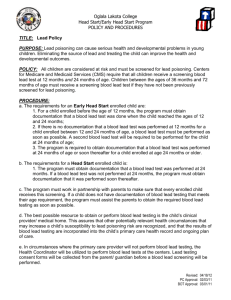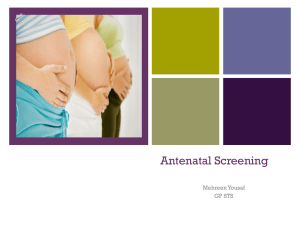Functional Assessment Screening of Older Adults
advertisement
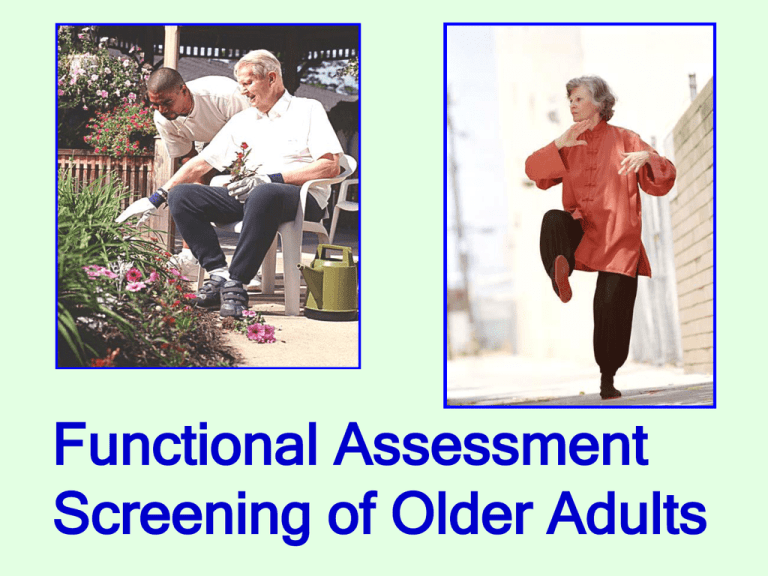
Functional Assessment Screening of Older Adults The quality of life is determined by its activities. Aristotle Functional Screening is important because… • Chronological age is poor indicator of ability. • Hospitalized older adults are at high risk for loss of function skills. – Environmental constraints (IV’s, catheters, side rails) – Decreased expectations for performance (ageism) – New disabilities or illness • Loss of functional abilities is a major cause of institutionalization. What do you think? What would be your first impression of this man if the first time you met him he was in a gown, lying in a hospital bed, trying to pull out his IV, and was confused? What if you knew he was 70 years old? What would you assume about his level of function? What if…..? you knew he was a regular surfer and ran a multi-million dollar company? Would that change your expectations of his function? Why or why not? The goal of a functional assessment screening is to… restore or improve health monitor changes enhance independence identify disabilities screen for issues needing further assessment and referral evaluate the need for community resources and equipment Environmental Community Physical Extended family Living environment Psychological Socioeconomical Functional assessment includes all of these components. Functional Assessment Screening A systematic review of these areas • • • • • • • • • • Vision / Hearing Mobility (arms, legs) Oral / Nutrition Elimination Cognitive ADL and IADL* Home Environment Social Support Chronic Pain Medications * ADL: Activities of Daily Living; IADL: Independent Activities of Daily Living When doing an assessment… • Assess, don’t assume. • Watch, don’t just ask. • Obtain baseline information: it is important to know what is normal for this individual. • Identify what helpers, equipment, and supports make doing activities of daily life possible. Vision Screening • Condition of glasses • Snellen chart • When was the last eye exam? Minimum is every two years. If diagnosed with diabetes or an eye condition such as glaucoma, eye exams could be as frequent as every 6-12 months. Hearing • Whisper test (Stand behind the person and whisper a word in each ear.) • Finger rub (Stand behind the person and rub two fingers together by each ear.) Keep going, there is more Hearing • Cerumen – Build up interferes with the conduction of sound. • Hearing aids Cerumen – Check batteries frequently; they last anywhere from less than a week to less than a month. – Can cause an increase of cerumen impaction. Upper Extremities Can the individual… • touch the palms of the hands to back of the head? • reach up over the head? • touch the hands together behind the waist? Upper Mobility is needed for… • Combing and washing hair • Getting items off a shelf • Putting on a shirt What other activities require upper mobility? Lower Extremities • “Get Up and Go” Test – – – – Get up from a chair Walk 10 feet Turn around and walk back Sit down again • Problems with the above correlate with abnormal gait and increased risk of falling. Oral Screening Inspect the oral cavity and check … – the condition of teeth – the condition and fit of dentures – for oral lesions or infections such as candidiasis Ask… • Do you have any problems eating or swallowing? • When was your last dental appointment? Quadruple A’s of Nutrition • Appearance Does the person look well nourished? • Appetite How is the person’s appetite? • Access Does the person have access to funds to buy food? Get to the store? For more information: DETERMINE nutrition screen for older adults in Optimal Aging Competency • Ability Can the person prepare own meals? Open cans? Cook safely? Elimination: “DRIP” D R - Delirium, Depression, Dementia - Retention, Restricted mobility and/or environment I - Infection, Inflammation, P - Pharmaceuticals, Polyuria Impaction If incontinence is a new problem, it must be evaluated further. Cognitive Function • Delirium – onset hours to days • Depression – onset weeks to months • Dementia – onset months to years Remember! If an older adult was not confused a few hours or days ago, his or her confusion usually indicates an acute problem that requires prompt evaluation. For more information: The Three Ds of Confusion in the Adapting Care Competency Cognitive Function Screening Tools • Short Blessed Test (SBT) • Geriatric Depression Scale (GDS) • Cornell Depression Scale These tools do not diagnose a condition. They merely indicate that further follow-up is necessary. Activities of Daily Living Ask if need help with activities done every day, such as … –Bathing and grooming –Ambulation –Transfers –Toileting –Eating –Dressing Instrumental Activities of Daily Living Ask if need help with activities which are more complex, such as … • Writing • Reading • Cooking • Cleaning • Shopping • Doing laundry • Going up stairs • Using the telephone • • • • Outside activities Managing medications Managing money Transportation Home Environment • Ask if have trouble going up and down stairs. • Ask if have had any falls inside or outside of the home. • What kinds of safety hazards should you assess that might be present in the home? Social Support • Who would be able to help in case of illness or emergency? • What community and family resources are available? Chronic Pain • Do you experience pain that prevents you from doing certain activities? Medications • What medications do you take? • What are the medications for? • Do you have any trouble taking them? Caregivers Being a caregiver is hard work. It is not unusual for a caregiver to neglect his or her own health while taking care of a loved one. Be sure to ask the caregiver how he or she is doing and what ways he or she is using to take care of self. Remember: Preserving, nurturing, measuring, recording, and communicating function are the core of good geriatric care. Functional Assessment Screening of Older Adults was prepared by Catherine Van Son, Ph.D., R.N., for the Older Adult Focus Project, OHSU School of Nursing.
